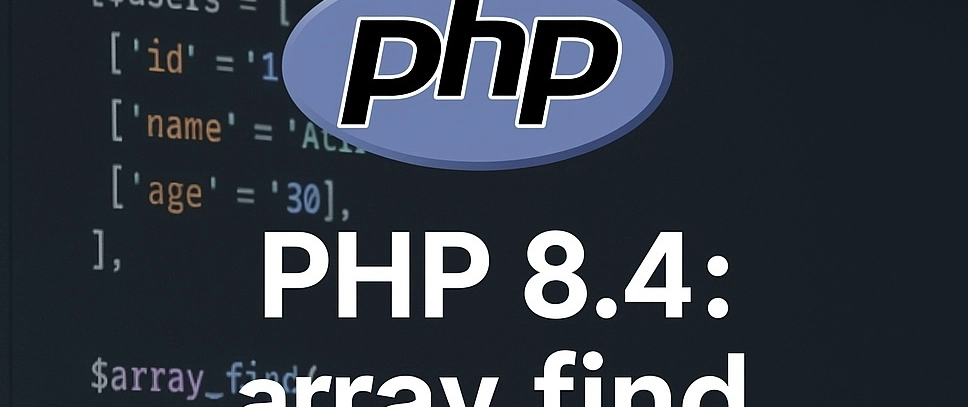PHP 8.4’s array_find Function: Innovative and Practical, or Just a Nice-to-Have?
💡PHP 8.4 introduces a new function, array_find, which makes array searching more elegant. But is it really worth using? This article comprehensively analyzes its practicality, limitations, and best practices.↓
PHP 8.4 has been released on schedule, with new features rolling out left and right. Among them, the introduction of the array_find() function caught my attention. This function allows developers to define custom search conditions using a closure, making array searches more flexible and modern.
In the PHP community, updates like these—often seen as “syntactic sugar”—tend to spark debate: some think it’s a practical evolution, while others question whether it’s just “extra fluff.”
So, is array_find() really useful? Should we widely adopt it in our projects? Let’s explore this from various angles.
🧠The Core Ability of array_find: Searching Goes Beyond Value Matching
Let’s take a look at an example. We have a set of user data and need to find a user who is 30 years old and whose name starts with “A.”
Traditional Way:
Using PHP 8.4’s array_find():

You’ll notice that the latter is more concise, expressive, and reduces the likelihood of errors in manually written loop logic.
✅Advantages: Modern, Flexible, Readable
Improved Readability: Encapsulating the search logic in a closure makes the intention clearer.
Consistent with Functional Paradigm: It aligns with the style of functions like array_map(), array_filter(), etc.
More Flexible: Easily enables condition-based searches, applicable in data processing, configuration filtering, and more.
❌Limitations: Not Suitable for All Scenarios
Compatibility Issues: Requires PHP 8.4, and many projects haven’t upgraded to this version yet.
Unnecessary for Simple Searches: If you’re simply searching for a specific value, in_array() or array_search() is still lighter.
Learning Curve: For developers new to PHP, closure syntax might be a bit unfamiliar.
Usage Advice: Weighing the Scenario and Code Style
If you’re developing a new project and have already migrated to PHP 8.4, feel free to use array_find().
It makes the code more modern and maintainable. Especially when paired with modern development tools (like ServBay) to manage your local PHP environment, you can almost embrace new features cost-free and enhance the overall development experience.
However, if you’re maintaining legacy projects or just need a quick search for a simple value, sticking to the basics might be a better choice.
⏬GitHub Demo Download:
https://github.com/Taurus0109/PHP-8.4-s-array_find-/blob/19d0af3dac2a2a149b0d8466e527a13aa902e2a6/php8.4-array_find-demo.zip
In this demo, you will find:
✅A comparison of array_find() with traditional foreach loops.
✅A quick execution example.
✅Recommended use of ServBay to easily run PHP 8.4 locally.
Conclusion: Worth Trying, But Not a Silver Bullet✅
array_find() is a clear and useful addition. It won’t change your development world, but it can save you from redundant work when needed.
Modern PHP is becoming more elegant, and we should consider aligning our code style with this trend.
What do you think?Do you plan to use array_find() in your projects? Are you more inclined to try new PHP features, or do you prioritize stability and compatibility? Feel free to comment and share your thoughts!


